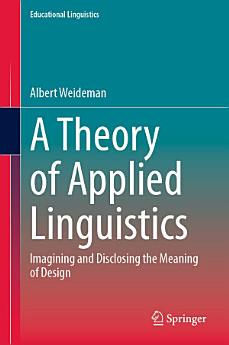A Theory of Applied Linguistics: Ιmagining and Disclosing the Meaning of Design
About this ebook
The book offers a response to the question of the usefulness of theory. The principles of design revealed in the theoretical analysis are given shape in developing imaginative language interventions to solve vexing language problems not for the sake of theory, but for the benefit of those affected.
The book is intended for use both as a reference and as a comprehensive, unifying perspective of what the field is, by scholars in applied linguistics and related fields (TESOL, ESL, ESP, EAP, SLA studies, language assessment and testing, language policy development), by postgraduate students or those who teach or study applied linguistics.
About the author
Albert Weideman is Professor of Applied Language Studies and Research Fellow at the University of the Free State. He is a rated researcher with the National Research Foundation in South Africa, has published more than ninety articles in accredited national as well as in international journals, and is the author of several books. These include Beyond expression: A systematic study of the foundations of linguistics (Van Schaik/Paideia Press 2009) and Responsible design in applied linguistics: Theory and practice (Springer, 2017). He was the main editor of Assessing academic literacy in a multilingual context: Transition and transformation (2021, Multilingual Matters), and co-editor of and contributor to Ethics and context in second language testing: Rethinking validity in theory and practice (Routledge, 2024). He has recently contributed chapters to Toegepaste taalkunde in Afrikaans (2022), to the third edition of Kontemporêre Afrikaanse taalkunde (2024; both from Van Schaik), and to a forthcoming volume in the Cambridge University Press series Studies in Language Testing (SILT) on Learning about assessing language: a matter of literacy or competency development? (Eds. B. Baker & L. Taylor).








